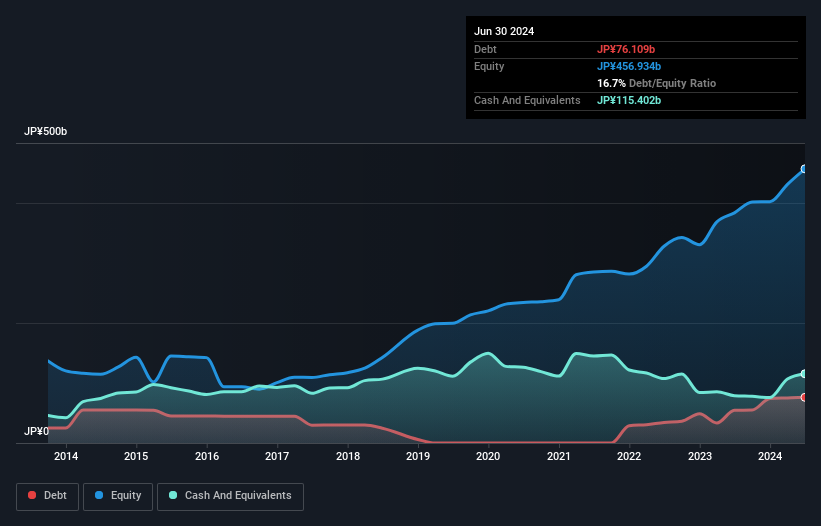- Japan
- /
- Semiconductors
- /
- TSE:6857
These 4 Measures Indicate That Advantest (TSE:6857) Is Using Debt Reasonably Well

David Iben put it well when he said, 'Volatility is not a risk we care about. What we care about is avoiding the permanent loss of capital.' It's only natural to consider a company's balance sheet when you examine how risky it is, since debt is often involved when a business collapses. Importantly, Advantest Corporation (TSE:6857) does carry debt. But should shareholders be worried about its use of debt?
What Risk Does Debt Bring?
Debt assists a business until the business has trouble paying it off, either with new capital or with free cash flow. Ultimately, if the company can't fulfill its legal obligations to repay debt, shareholders could walk away with nothing. While that is not too common, we often do see indebted companies permanently diluting shareholders because lenders force them to raise capital at a distressed price. By replacing dilution, though, debt can be an extremely good tool for businesses that need capital to invest in growth at high rates of return. When we think about a company's use of debt, we first look at cash and debt together.
Check out our latest analysis for Advantest
What Is Advantest's Net Debt?
The image below, which you can click on for greater detail, shows that at June 2024 Advantest had debt of JP¥76.1b, up from JP¥54.5b in one year. However, its balance sheet shows it holds JP¥115.4b in cash, so it actually has JP¥39.3b net cash.

How Healthy Is Advantest's Balance Sheet?
According to the last reported balance sheet, Advantest had liabilities of JP¥149.4b due within 12 months, and liabilities of JP¥116.9b due beyond 12 months. Offsetting this, it had JP¥115.4b in cash and JP¥98.7b in receivables that were due within 12 months. So its liabilities outweigh the sum of its cash and (near-term) receivables by JP¥52.2b.
This state of affairs indicates that Advantest's balance sheet looks quite solid, as its total liabilities are just about equal to its liquid assets. So it's very unlikely that the JP¥4.82t company is short on cash, but still worth keeping an eye on the balance sheet. While it does have liabilities worth noting, Advantest also has more cash than debt, so we're pretty confident it can manage its debt safely.
In fact Advantest's saving grace is its low debt levels, because its EBIT has tanked 28% in the last twelve months. Falling earnings (if the trend continues) could eventually make even modest debt quite risky. There's no doubt that we learn most about debt from the balance sheet. But ultimately the future profitability of the business will decide if Advantest can strengthen its balance sheet over time. So if you want to see what the professionals think, you might find this free report on analyst profit forecasts to be interesting.
Finally, while the tax-man may adore accounting profits, lenders only accept cold hard cash. While Advantest has net cash on its balance sheet, it's still worth taking a look at its ability to convert earnings before interest and tax (EBIT) to free cash flow, to help us understand how quickly it is building (or eroding) that cash balance. In the last three years, Advantest's free cash flow amounted to 36% of its EBIT, less than we'd expect. That weak cash conversion makes it more difficult to handle indebtedness.
Summing Up
We could understand if investors are concerned about Advantest's liabilities, but we can be reassured by the fact it has has net cash of JP¥39.3b. So we don't have any problem with Advantest's use of debt. There's no doubt that we learn most about debt from the balance sheet. But ultimately, every company can contain risks that exist outside of the balance sheet. These risks can be hard to spot. Every company has them, and we've spotted 1 warning sign for Advantest you should know about.
If you're interested in investing in businesses that can grow profits without the burden of debt, then check out this free list of growing businesses that have net cash on the balance sheet.
New: Manage All Your Stock Portfolios in One Place
We've created the ultimate portfolio companion for stock investors, and it's free.
• Connect an unlimited number of Portfolios and see your total in one currency
• Be alerted to new Warning Signs or Risks via email or mobile
• Track the Fair Value of your stocks
Have feedback on this article? Concerned about the content? Get in touch with us directly. Alternatively, email editorial-team (at) simplywallst.com.
This article by Simply Wall St is general in nature. We provide commentary based on historical data and analyst forecasts only using an unbiased methodology and our articles are not intended to be financial advice. It does not constitute a recommendation to buy or sell any stock, and does not take account of your objectives, or your financial situation. We aim to bring you long-term focused analysis driven by fundamental data. Note that our analysis may not factor in the latest price-sensitive company announcements or qualitative material. Simply Wall St has no position in any stocks mentioned.
About TSE:6857
Advantest
Manufactures and sells semiconductors, component test system products, and mechatronics related products in Japan, the Americas, Europe, and Asia.
Outstanding track record with excellent balance sheet.
Similar Companies
Market Insights
Community Narratives



